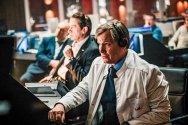So I've just saw a video about Bladerunner 2049's financial failure and Dune's financial success and I need to start another random lament.
I don't get it really, because the I personally think the former is a way better movie than the latter. Both movies are atmospheric and moody(which i dig) as it's both done by the same Director. I don't have any criticism of 2049 except that some of the drawn out sequences could shorter without taking anything away. It has a fresh story and touched poignantly on the less explored aspect of human emotion/themes.
if you haven't watched it yet, go and watch it and make sure to watch it with zero distractions around.
Dune's story.....let's be honest has being done to death by this point, a big bad evil mining corp is fighting a planet's natives(who's uber spiritual and in-tune with the environment) for resources while MC defects to the natives while inexplicable falling in love with some Native girl(look I like Avatar because Pandora has unbelievable pretty nature). I know its an adaption of a really old book, but it doesn't change the fact that I'm watching it in 2021. Good thing that avatar cut out the scene(it's on youtube) where the MC have to 1v1 some disgruntled native man who hate him for being an outsider.
The combat in Dune is just not for me personally, cold steel sword fights in futuristic armour looks abit goofy. But it's scenic and moody so I guess it has that going for it.
As a huge fan of
Blade Runner,
Blade Runner 2049,
Dune (2021) and Frank Herbert's original
Dune novels (all six!), I feel I must defend the latter pair.
First, I think Villeneuve's
Dune is an aesthestic achievement that fully captures the pseudo-medieval nature of the world that it depicts. It's decisions in terms of character development, narrative and so forth are also quite strong. It is, I think, a better adaptation (of the first half of the first novel) than one could've hoped for.
That said, I do think it falls short, as probably any film must, in capturing the more philosophical and didactic elements of the work that made it so profoundly influential on many young men (and it was mostly men) encountering it for the first time in their teenage years, including myself.
Dune resonated strongly so many others because it hits the young reader with a freight train of ideas that they may not have previously encountered, about the nature of power, the role of religion in history and society, the environment as shaping persons and societies, foreknowledge and destiny, the long-term view of history, relations between men and women and the power of sex, attitudes towards technology. And if I may say so, these ideas are explored in ways that undermine your critique. Allow me to sketch a couple of examples:
1) The Emperor's power in part comes from his control of the Sardaukar, a people from a planet so hellish and brutal that only the strongest and toughest survive, thereby serving as the ultimate warriors. They are clearly inspired by the mythology that has built up around Sparta. The Atreides identify the Fremen as useful for the same reasons: they are the product of a particularly harsh environment and accordingly make superb warriors. It's not that the Atreides are just nice people, rather they intend to leverage the Fremen to advance the position of their house, which first means trying to understand and make peace with them.
Arrakis and the Fremen are clearly inspired by and reflect European fascination with the Arab and Persian worlds, the stagnant and decaying societies that Europeans encountered in the 18th/19th century that yet carried the wisdom and grandeur of the past and seemed to embody a purity that had been lost in Europe and America. Of course this perspective was limited even then, but its increasing distance from contemporary western attitudes to the Middle East, North Africa, and Islamic (i.e. fear and contempt) make it arguably more intriguing than it was at the time.
There is a very brief scene in the film, during the Harkonnen's attack, that has the Atreides soldiers descending the stairs in ranks and engaging the Harkonnen soldiers, while the Sardaukar slip in behind them and ultimately decimate the Atreides. To show so clearly the discipline, competence and strength of the Atreides, and then how utterly outmatched they were, all in less than thirty seconds, is a remarkable cinematic feat.
Also, in the book the Fremen are not
just idealised extrapolations from the values of the dominant culture. In the book Paul must marry the wife of the Fremen man he killed at the end of the film and take responsibility for his children, meaning he has two wives. I will be interested to see if the next film depicts this, or if the will "smooth down" those rough edges as they have minimized the more overtly Islamic elements of Arrakis and the Fremen.
2) Paul fails. During the sandstorm, in the tent, he is seized with a vision of a Fremen-powered empire marching across the galaxy and he knows this is what his mother has envisioned for him and he recoils from that vision, realising then that she is his enemy. Yet this is ultimately the path he walks. His ostensibly Godlike powers do not permit him to break out of the path that has been set. He knows before he walks into the Fremen's house that the nuclear device awaits that will strip away his sight. He knows that Chani will die in childbirth and is powerless to prevent it. And he ultimately flees the role of Messiah to lose himself in women and drugs. This is not a typical "hero's journey".










